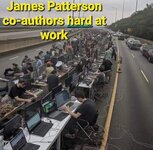At this moment, Axel Springer is talking about journalism, but many of the roles he intends to cut and replace with AI apply to any sort of writing.
A quote from a piece in The Guardian:
The newspaper would “unfortunately be parting ways with colleagues who have tasks that in the digital world are performed by AI and/or automated processes”, its owner, Europe’s largest media publisher, Axel Springer SE, said in an email to staff.
https://www.theguardian.com/world/2...ld-to-replace-range-of-editorial-jobs-with-ai
It said the roles of “editors, print production staff, subeditors, proofreaders and photo editors will no longer exist as they do today”, according to the email, seen by the rival Frankfurter Allgemeine newspaper (FAZ).
Editors, proof-readers, sub-editors (what we would call copy editors, or simply editors) all exist also in the world of fiction. Even the photo-editor roles are not a long jump to art-director.
So, is this a sign of the times, or the end-times. Are we worried?
A quote from a piece in The Guardian:
The newspaper would “unfortunately be parting ways with colleagues who have tasks that in the digital world are performed by AI and/or automated processes”, its owner, Europe’s largest media publisher, Axel Springer SE, said in an email to staff.
https://www.theguardian.com/world/2...ld-to-replace-range-of-editorial-jobs-with-ai
It said the roles of “editors, print production staff, subeditors, proofreaders and photo editors will no longer exist as they do today”, according to the email, seen by the rival Frankfurter Allgemeine newspaper (FAZ).
Editors, proof-readers, sub-editors (what we would call copy editors, or simply editors) all exist also in the world of fiction. Even the photo-editor roles are not a long jump to art-director.
So, is this a sign of the times, or the end-times. Are we worried?

